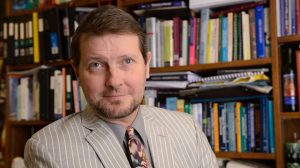
Randy Wadkins. Photo by Kevin Bain/Ole Miss Communications
OXFORD, Miss. – Recent breakthroughs in nanomedicine and their impact is the topic for a monthly public science forum organized by the University of Mississippi Department of Physics and Astronomy.
The spring semester’s first meeting of the Oxford Science Cafe is set for 6 p.m. Jan. 24 at Lusa Bakery Bistro and Bar, 1120 North Lamar Blvd. Randy Wadkins, professor of chemistry and biochemistry and associate member of the UM Medical Center Cancer Institute, will review his 2015 TEDxUM talk, “A Fantastic Voyage to the Future of Nanomedicine.” Admission is free.
Organizers of TEDxUM 2017 said they teamed up with the Science Cafe as a promotional activity for the main event, scheduled Jan. 28 in the Gertrude C. Ford Center for the Performing Arts. Wadkins was one of 10 speakers at the inaugural TEDxUM in October 2015.
“Imagine shrinking down robots to a size so small that they can be injected into humans,” Wadkins said. “Imagine them swimming around in our bodies until they reach the sites of disease, where they apply treatment. That future is called nanomedicine, and it is almost here.”
Wadkins’ 30-minute presentation will include how nanomedicine has moved from science fiction in the 1970s to reality. The fluorescent properties and common uses of nanomaterials in daily household products are also highlighted.
“On the nanometer scale, the very small things, such as molecules, are on one end, while the larger things, such as bacteria, are on the other end,” he said. “In between the two is where a lot of new and exciting things in science is happening.”
Wadkins’ research focuses on biologically compatible nanomaterials for possible medical purposes within the human body.
“In 2006, a scientist at Cal-Tech discovered a way to weave nanomaterials with DNA,” Wadkins said. “These can be manipulated into robots that can do things. The future of medicine lies at the nano-scale.”
The university’s first TEDx talk featured 10 brief lectures from Ole Miss faculty members to showcase “ideas worth spreading.” Though the event was open to only 100 attendees, those talks are available on YouTube for everyone who missed it.
“TEDxUM 2015” used the TED Talks conference format, which brings together lecturers and other participants in a globally popular set of conferences run by the Sapling Foundation. Under the rules set by TED, seating was limited for the event, although interest was very high.
UM administrators and professors said Wadkins’ appearance should be most interesting.
“Dr. Wadkins is one of the most prominent scientists in the U.S. using DNA as a nanomaterial,” said Marco Cavaglia, associate professor of physics and astronomy. “His wealth of knowledge is sure to inspire and inform those in attendance.”
Wadkins earned his doctorate and bachelor’s degrees from UM. He was a postdoctoral fellow at the Max Planck Institute for Biophysical Chemistry in Germany and at St. Jude Children’s Research Hospital. He was an assistant professor of oncology at the Johns Hopkins School of Medicine before returning to UM.
He also was a 2015-2016 AAAS Science & Technology Congressional Fellow, working in the office of U.S. Rep. Steve Cohen of Memphis. His research interests are biophysical chemistry, molecular dynamics, fluorescence microscopy and imaging, DNA structure and structural transitions and biosensors.
For more information about Oxford Science Cafe programs, go to http://www.phy.olemiss.edu/oxfordsciencecafe. For more information about the Department of Physics and Astronomy, visit http://www.olemiss.edu/depts/physics_and_astronomy or call 662-915-7046.